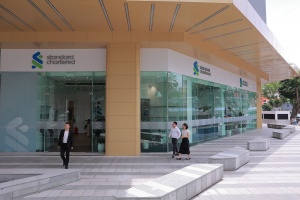New green benchmarks set for the financial landscape
 |
| Hanh Nguyen, deputy general director of Standard Chartered Vietnam |
Can you shed light on the bank’s initiatives and milestones in amplifying environmental, social, and governance (ESG) criteria within the country’s financial landscape, with Asia Money recognizing Standard Chartered Vietnam as the Best ESG Bank of 2022?
The accolade from Asia Money reflects our unwavering commitment to advancing ESG and sustainable finance aspects in Vietnam. Standard Chartered has always taken pride in being a vanguard for such imperatives.
In Vietnam, we’ve made targeted interventions by strategically channeling finance into areas that offer the highest ESG impact. A hallmark of our commitment in this arena is the LEED Gold certification awarded to our Vietnam Head Office in Hanoi, indicating our penchant for promoting environmentally sustainable practices.
In August 2023 in Hanoi, in collaboration with the Department of Climate Change under the Ministry of Natural Resources and Environment and CIX Singapore, we organised a seminar on establishing a voluntary carbon credit exchange for representatives from relevant ministries, financial institutions, and enterprises. The workshop provided new opportunities for market participants to reduce the GHG emissions to achieve the net-zero target.
The Mekong Delta province of Ben Tre is selected to be the centre for green and clean energy development. In April 2023, we were very proud to join hands with the Ben Tre People Committee, Department of Planning and Investment of Ben Tre to organise a workshop about integration of ESG into the business strategy and operations. The workshop was well-attended by local authorities, local banks, and corporates.
In 2022, we launched green mortgage loan and carbon-neutral debit and credit cards. Each year, we issue three million cards under carbon-neutral programme in the markets. Taking into account the full life cycle of a card – from material extraction to end-of-life disposal – enrolling three million cards the bank issues annually into the carbon-neutral programme will bring 450 tonnes of carbon dioxide equivalent savings per year, translating to approximately 15 million plastic bags. These are part of a series of green products to encourage clients to adopt a greener lifestyle and protect the environment.
We partnered with British Chamber of Commerce in Vietnam to run a series of sustainability webinars, which aim to promote sustainable development and application of ESG among businesses. Our webinars attracted over 500 key stakeholders from the government, regulators and industry thought leaders. The series focused on ESG and sustainability which supported participating businesses and organisations to devise effective strategies for sustainable development.
Sustainable finance is gaining ground globally. Could you elucidate what it entails and its intersection with ESG, particularly in relation to the banking sector?
Sustainable finance is defined as investment and lending decisions that consider ESG factors of an economic activity or project. In modern banking, sustainable financial assets and liabilities might be in the form of loans, bonds, or funds. These instruments are often tagged with labels that reflect their ethos, ranging from ‘green’ and ‘sustainable development goals’ to ‘transition’, ‘impact’, or ‘sustainability-linked’.
For Standard Chartered, embracing sustainable finance isn’t merely about ticking off a checklist. It is about weaving ESG principles into the very DNA of our operations and offerings, ensuring that our staff members, clients, or investors, are engaged in the broader vision of a sustainable future.
The landscape of sustainable finance has changed rapidly over the last two decades. What is Standard Chartered’s involvement in sustainable finance, in terms of its suite of products and the strategic projects undertaken?
Our sustainability journey started 20 years ago with the establishment of our first chief sustainability officer team. Since then, we have evolved the team to include members looking at sustainable finance, transition finance, advisory, enablement, blended finance, biodiversity, net-zero, and various other aspects supporting our aspirations to reach net-zero by 2050. To date, we have over 30 product variants tailored for Sustainable Finance within our Corporate, Commercial, and Institutional Banking (CCIB) segment. To support the labelling of these 30 over product variants, Standard Chartered currently has rolled out several sustainable products frameworks such as the transition framework or our green and sustainable product framework.
Training and upskilling form a crucial part of our initiative, and we’ve publicly committed to ensuring that at least 70 percent of our relevant staffs to complete our Sustainable Finance training programme. These are just some of the many efforts we undertake as a bank to engage our clients across industries and encourage the transition to a low carbon economy.
Greenwashing has emerged as a contentious issue within the financial industry. What are your insights on this challenge, and how does Standard Chartered ensure both its own practices and those of its clients remain truly green?
As mentioned, we believe that education is also an essential component. Internally, we have training sessions for our stakeholders. Externally, our client conversations and making “green” their business and their supply chain are something that we have embraced since many years ago.
In workshops and events, Standard Chartered always shares best practices and case studies so that participants are aware of the consequence of greenwashing, as well as raise their awareness on the right meaning of doing green or practicing ESG properly.
Our approach to mitigating greenwashing risk covers transparency, expertise, governance, review, and verification. Firstly, we public our framework on green and sustainable products and ESG management. We apply this framework to all our CCIB clients and embed it directly into our client review and credit approval process.
Secondly, each transaction on sustainable finance we engage in is linked to a product that was approved. Thirdly, there are several committees within our group to support the Board and Management team on monitoring of climate change and its impacts.
Last but not least, we continue to review and verify our frameworks and sustainable finance assets through external verification. This is to ensure that we are labelling the right assets and use of proceed transactions as green or social.
Accessing green financing typically requires businesses to meet specific ESG criteria. Could you share the criteria related to this that businesses must adhere to when seeking green or sustainable finance solutions from Standard Chartered?
Our product framework outlines the criteria for qualifying as green or sustainable assets, which is both publicly accessible and externally verified by Sustainalytics.
This framework encompasses diverse categories like energy efficiency, sustainable management of natural resources, pollution prevention and control, sustainable water and wastewater management, clean transportation, climate change adaptation, green financing instruments, to name a few. Each category has its specific evaluation benchmarks.
With over 20 years of experience in this sector, we’ve been assisting clients in structuring their businesses through a sustainable financing prism. When a business aligns itself with our financing framework, it becomes easier to tap into international liquidity, underscoring the dual benefits of sustainability and economic viability.
 | Standard Chartered Vietnam injects $60 million in fresh capital Standard Chartered Vietnam has underscored its long-standing commitment to the nation's growth with a robust $60 million capital infusion, marking another chapter in its enduring relationship and aligning with its strategic intent to amplify onshore operations and foreign direct investment. |
 | ESG in financial sector driving economic development As Vietnam needs $368 billion to reach its net zero goal by 2050, financial institutions play an extremely important role in mobilising capital to achieve this goal. |
 | Standard Chartered brings its globally renowned marathon to Vietnam The iconic Standard Chartered Marathon is set to come to in Vietnam as the company announces its title sponsorship for the Hanoi Marathon Heritage Race. |
What the stars mean:
★ Poor ★ ★ Promising ★★★ Good ★★★★ Very good ★★★★★ Exceptional
Related Contents
Latest News
More News
- Banking sector targets double-digit growth (February 23, 2026 | 09:00)
- Private capital funds as cornerstone of IFC plans (February 20, 2026 | 14:38)
- Priorities for building credibility and momentum within Vietnamese IFCs (February 20, 2026 | 14:29)
- How Hong Kong can bridge critical financial centre gaps (February 20, 2026 | 14:22)
- All global experiences useful for Vietnam’s international financial hub (February 20, 2026 | 14:16)
- Raised ties reaffirm strategic trust (February 20, 2026 | 14:06)
- Sustained growth can translate into income gains (February 19, 2026 | 18:55)
- The vision to maintain a stable monetary policy (February 19, 2026 | 08:50)
- Banking sector faces data governance hurdles in AI transition (February 19, 2026 | 08:00)
- AI leading to shift in banking roles (February 18, 2026 | 19:54)

 Tag:
Tag:




















 Mobile Version
Mobile Version